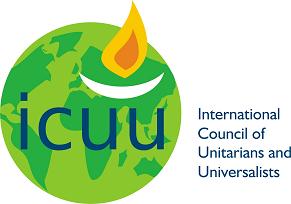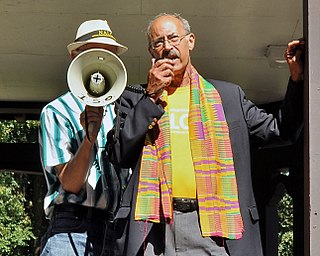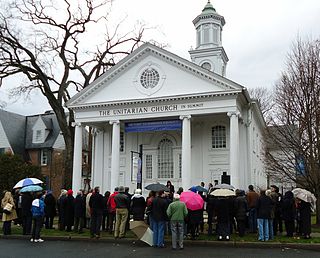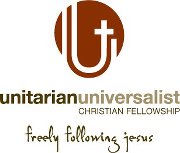
The Canadian Unitarian Council (CUC) is a liberal religious association of Unitarian, Universalist, and Unitarian Universalist congregations in Canada. It was formed on May 14, 1961, initially to be the national organization for Canadians belonging to the Unitarian Universalist Association (UUA) which formed a day later on May 15, 1961. Between 1961 and 2002, almost all member congregations of the CUC were also members of the UUA and most services to congregations in Canada were provided by the UUA. However, in 2002, the CUC formally became a separate entity from the UUA, although the UUA continues to provide ministerial settlement services and remains the primary source for education and theological resources. Some Canadian congregations have continued to be members of both the CUC and the UUA, while most congregations are only members of the CUC.

The International Council of Unitarians and Universalists (ICUU) was an umbrella organization founded in 1995 comprising many Unitarian, Universalist, and Unitarian Universalist organizations. It was dissolved in 2021 along with the Unitarian Universalist Partner Church Council to make way for a new merged entity. Some groups represented only a few hundred people; while the largest, the Unitarian Universalist Association, had more than 160,000 members as of May 2011—including over 150,000 in the United States.

Modern paganism, also known as contemporary paganism and neopaganism, spans a range of new religious movements variously influenced by the beliefs of pre-modern peoples across Europe, North Africa, and the Near East. Despite some common similarities, contemporary pagan movements are diverse, sharing no single set of beliefs, practices, or religious texts. Scholars of religion may study the phenomenon as a movement divided into different religions, while others study neopaganism as a decentralized religion with an array of denominations.

Unitarian Universalist Association (UUA) is a liberal religious association of Unitarian Universalist congregations. It was formed in 1961 by the consolidation of the American Unitarian Association and the Universalist Church of America, respectively. However, modern Unitarian Universalists see themselves as a separate religion with its own beliefs and affinities. They define themselves as non-creedal, and draw wisdom from various religions and philosophies, including humanism, pantheism, Christianity, Hinduism, Buddhism, Taoism, Judaism, Islam, and Earth-centered spirituality. Thus, the UUA is a syncretistic religious group with liberal leanings.

Unitarian Universalism is a liberal religious movement characterized by a "free and responsible search for truth and meaning". Unitarian Universalists assert no creed, but instead are unified by their shared search for spiritual growth. Unitarian Universalists do not have an official, unified corpus of sacred texts. Unitarian Universalist congregations include many atheists, agnostics, deists, and theists; there are churches, fellowships, congregations, and societies around the world.

Starhawk is an American feminist and author. She is known as a theorist of feminist neopaganism and ecofeminism. In 2013, she was listed in Watkins' Mind Body Spirit magazine as one of the 100 Most Spiritually Influential Living People.
Flower Communion, also known as Flower Ceremony, Flower Festival, or Flower Celebration, is a ritual service common in Unitarian Universalism, though the specific practices vary between congregations. It is usually held on the last Sunday of worship in late May or June, as some congregations recess from holding services during the summer. Some congregations hold the ceremony earlier in the spring, sometimes coinciding with Mother's Day or Easter.
The Water Communion is a ritual service common in Unitarian Universalist congregations. It is usually held in the fall, during September, as it is the beginning of the Liturgical year.
Reclaiming is a tradition in neopagan witchcraft, aiming to combine the Goddess movement with feminism and political activism. Reclaiming was founded in 1979, in the context of the Reclaiming Collective (1978–1997), by two Neopagan women of Jewish descent, Starhawk and Diane Baker, in order to explore and develop feminist Neopagan emancipatory rituals.

The Rev. William G. Sinkford is a Unitarian Universalist minister who served as the seventh president of the Unitarian Universalist Association of Congregations (UUA), from 2001 to 2009. His installation as UUA president made him the first African American to lead that organization, or any traditionally white religious denomination in the United States.

Unitarian Universalism, as practiced by the Unitarian Universalist Association (UUA), and the Canadian Unitarian Council (CUC), is a non-Creedal and Liberal theological tradition and an LGBTQ affirming denomination.

Religion in Scouting and Guiding is an aspect of the Scout method that has been practiced differently and given different interpretations in different parts of the world over the years.
The Unitarian Earth Spirit Network (UESN) is an association of Unitarian Universalists based in the U.K. that seeks to represent a Nature/Earth/Creation centred religious voice within the church. It was assisted by Jo Rogers as Secretary/Treasurer. The UESN provides a forum for this group and became a recognised, credible part of the British Unitarian movement.
Modern paganism in the United States is represented by widely different movements and organizations. The largest modern pagan religious movement is Wicca, followed by Neodruidism. Both of these religions or spiritual paths were introduced during the 1950s and 1960s from Great Britain. Germanic Neopaganism and Kemetism appeared in the US in the early 1970s. Hellenic Neopaganism appeared in the 1990s.

The Unitarian Universalist Christian Fellowship (UUCF) is the main group serving Christian Unitarian Universalists within the Unitarian Universalist Association of the United States, whose main office is based in Oak Ridge, Tennessee. The UUCF was founded in Boston, Massachusetts in 1945, and can trace its roots back through the history of North American Christian Universalism and Unitarianism. As its bylaws put it:
We serve Christian Unitarians and Universalists according to their expressed religious needs; uphold and promote the Christian witness within the Unitarian Universalist Association; and uphold and promote the historic Unitarian and Universalist witness and conscience within the church universal.
The Eno River Unitarian Universalist Fellowship (ERUUF) is a Unitarian Universalist (UU) congregation located in Durham, North Carolina. In 2018, over seven hundred people were members of ERUUF, making it the largest UU congregation in NC and one of the largest in the UUA.
The Church of the River, located in Memphis, Tennessee, is a member of the Unitarian Universalist Association, a liberal religious tradition.
Susan Frederick-Gray is a Unitarian Universalist minister who served as the ninth president of the Unitarian Universalist Association from 2017 to 2023. She was the first woman to be elected to the office.

Modern paganviews on LGBTQ people vary considerably among different paths, sects, and belief systems. There are some popular neopagan traditions which have beliefs often in conflict with the LGBT community, and there are also traditions accepting of, created by, or led by LGBT individuals. The majority of conflicts concern heteronormativity and cisnormativity.
The Unitarian Universalist Church of Boulder is a Unitarian Universalist ("UU") church in Boulder, Colorado.











